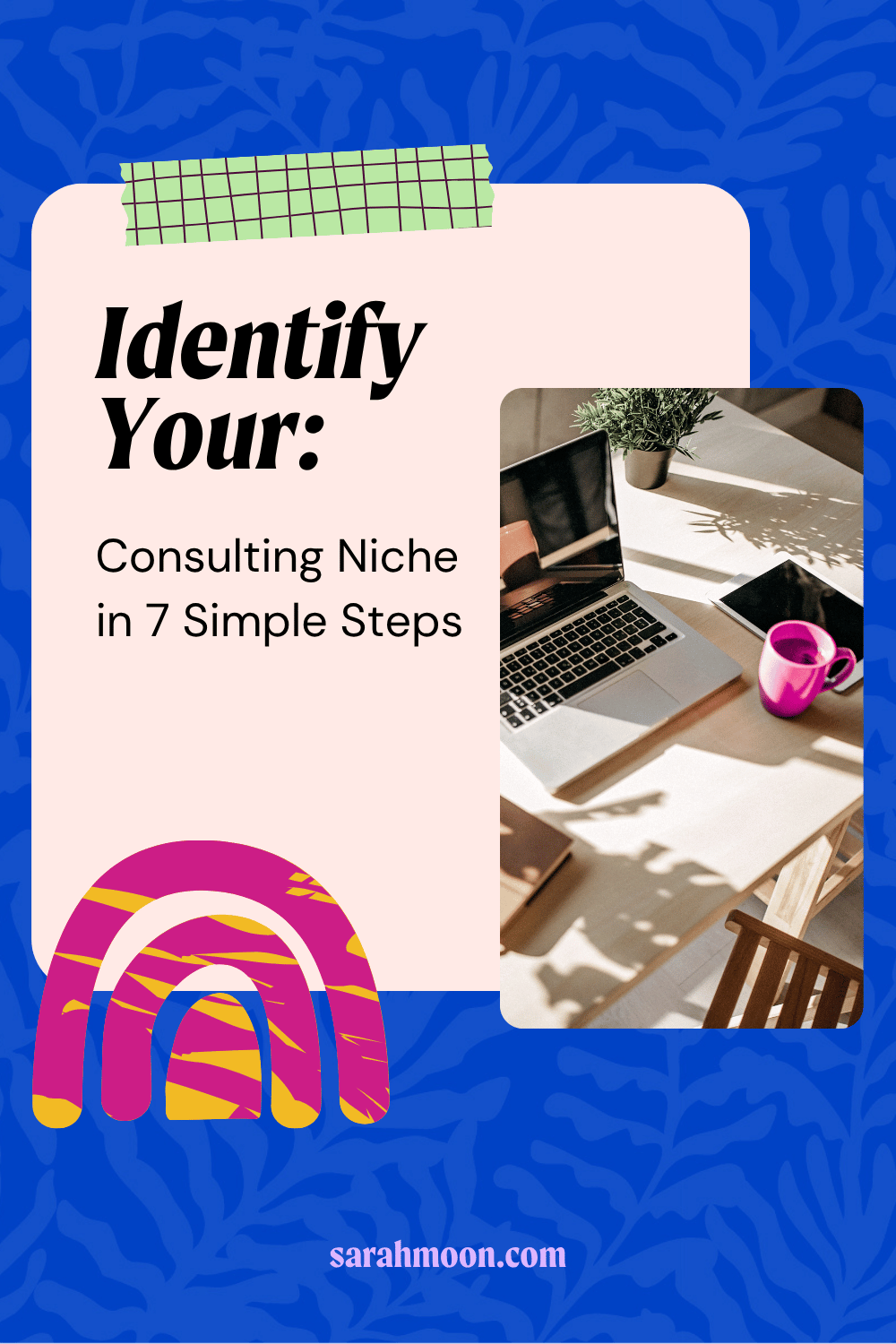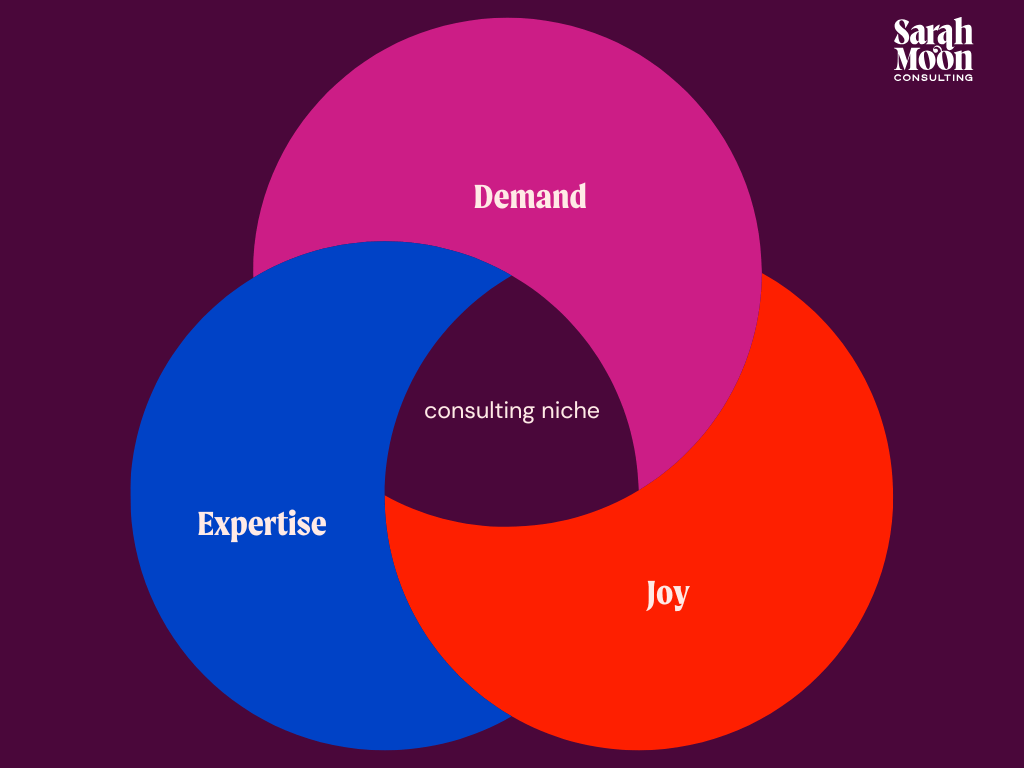The Ultimate Guide to Identifying Your Consulting Niche (Plus: 6 In-Demand Consulting Niches for 2026)
Note: This article was updated in Jan. 2026.
When I started the work to transition from a done for you agency to a solo consulting model, it was harder than I realized it would be—the biggest being figuring out the sweet spot of the niche I was going to find a home in. And this was with almost fifteen years of business behind me.
I had my signature Alignthority® framework, loads of client success stories, a solid and growing audience, and yet, committing to my niche was a challenge. I dove into research, talked to clients, and listened a lot to my gut instincts. Trial and error, experimentation, and refinement led to where I am now: a marketing and business strategy consultant for solo businesses with big missions.
In short, if you're struggling to narrow your consulting niches, worried that your field is overly saturated, I see you and I've got your back with this guide.
We'll dig into the best consulting niches, how to select yours, and strategies that we recommend (and discourage). Whether you're a seasoned pro who's been there, done that, or a newcomer to the field, this guide—based on both my real world experience and that of my clients—will get you started with the knowledge and tools to thrive as a new consultant exploring your niche.
Ready to discover your consulting niche? It's tougher than you'd expect!
Choosing the Right Consulting Niche is One of Your Most Important Business Decisions (But You Probably Won't Nail it the First Time)
Your consulting niche will define the focus of your business and determine the types of clients you work with, the services you offer, and the expertise you need to bring to the table. It's essential that you select a niche that aligns with your skills, interests, and market demand to ensure the long-term success of your consulting business.
If you've been offering done for you services instead of the advisory-style services that consultants provide (for example, SM&Co transitions from an agency model of done for you marketing to a strategic marketing consulting model a few years ago), your niche may be more apparent, but it's still critical to go through this process, as consulting is a very different game that done for you services.
Consulting Truth #1: Your Niche Lives at the Intersection of Client Demand, Subject Matter Expertise, and Joy
To effectively choose a consulting niche, think about a Venn diagram with joy, expertise, and client demand. Where everything overlaps? That's your sweet spot.
Consider the specific challenges where you have the most experience and knowledge. Evaluate the current and future demand for consulting services in those areas, and assess the competitive landscape to identify unmet needs or underserved segments.
You have to love your niche or else you'll quickly grow to hate your work and resent your clients.
Consulting Truth #2: Being All Things to All People is Losing Game
While it may seem tempting to offer general business consulting services to cater to a broad audience, this approach can actually hold back the growth of your consulting business as well as threaten its longterm sustainability.
Generalists struggle to stand out in a crowded market and build a brand. They also tend to attract clients in crisis and their price points are typically low. There are a handful of very large consulting firms that succeed in this area, yes, but they're swimming in a different consulting ocean than you are as a solo consultant.
Great clients are increasingly seeking specialized expertise and a compelling personal brand they can trust—by positioning yourself as a generalist, you risk being overlooked in favor of consultants with specific industry or functional knowledge. Or they go straight to the big players in consulting.
Consulting Truth #3: Leave Yourself Open to Opportunities—you won’t regret it
On the other hand, narrowing your focus too much, especially in the early stages of your consulting business, can also hold you back because you won't see the opportunities right in front of you.
While specialization is key to success in consulting, focusing too narrowly right from the start can limit your opportunities for growth and shut the door on opportunities. It's important to strike a balance between specificity and flexibility, allowing room for expansion as your business evolves.
For example, if your goal is to advise SaaS (software as a service) companies on their sustainability programs, you may want to offer this kind of consulting to a broader audience initially to build up case studies and success stories, especially if you don't have experience in the SaaS industry.
Also, being more open to opportunities early on may open doors you didn't expect. In fact, if I had narrowed my niche too quickly (I was considering focusing exclusively on solo attorney marketing strategy), I wouldn't have realized that solo consultants are such a core part of my audience. They started appearing in my inbox thanks to my content about messaging strategy, positioning, and pricing—and the rest is history!
Seven Steps to Finding Your Consulting Niche
Step #1: Explore both your skill set and passion
Start by getting really honest with yourself about what you love to do, where your knowledge lies, and who you get excited about helping.
What are the subjects or industries that you have deep knowledge of and are genuinely interested in? What is unique and special about your perspective? Your niche should align with your strengths and interests otherwise you'll lose motivation. (Ask me how I know!)
Step #2: Be clear-eyed about the market
Research the current market demand and trends in your field—be really honest about this. Market research is not just asking your Facebook friends if they think your niche sounds good. You want to go on a listening tool, hang out where people who talk about your potential niches hang out—and listen to them.
Look for areas experiencing growth and change. When I talk to clients, these are consistently the areas with this most intriguing opportunities for consultants. It's not the easiest route, but it's the one that can help you get known as a consultant and that you can build a strong brand around.
Step #3: Understand client aspirations—not just frustrations
Again, before you Identify your specific niche when you're on that listening tour, start noting common challenges faced by potential clients. Your niche should solve specific problems that your target clients are struggling with, or help your audience reach the heights they dream of.
For example, I work a lot with folks transitioning to being a solo consultant after corporate life or from service provider to consultant. I noticed that many of these folk struggle to document their unique system, model, and framework—and this is something I'm excellent at. So, I started offering consulting around that area, and introducing them to my own IP attorney so they can protect that asset.
Step #4: Know the competition—but competition probably doesn’t mean what you think it does
Again, pay attention to who's serving a similar audience and what they're offering. Is there a gap in the market? What can you bring that no one else does?
Also think about who else is serving this audience, but outside your subject matter expertise. Understanding if a potential client will be choosing between hiring an attorney to shore up their contracts or a brand strategist to elevate their visual design is key to thriving in competitive consulting spaces.
Step #5: Think about the "money stuff."
A lot of new consultants think about this too far down the road, and I believe you've got to do this sooner rather than later. For example, one of my Spark Sessions clients shared with me that she realized she was speaking to beginners who couldn't afford her legal strategy services—shifting her audience to one that's more established made those services an easier sell. On the other other, if you are passionate about a niche that's not as well financially resourced, you may need to offer bite-sized consulting services at volume—ask yourself if this is how you want to work. Maybe you'll love it, or maybe you'll need to look elsewhere.
Know your numbers, and know your audience's capacity.
Step #6: Ask yourself what niches you are excited about building your body of work around.
If you're going to be a successful solo consultant, you will have to do a lot of marketing. You'll need to develop a framework. You will need to talk about this on LinkedIn, in your newsletter, on your blog. Everywhere you go, you'll be talking about this. If the excitement for creating thought leadership isn't there? Well, you'll quickly hate your business.
Step #7: Is the client alignment there?
Finally, think about the types of people you want to work worth. What are their personal qualities, how do they work? Are they in a pressure cooker or are they more methodical? These are all things you need to think about before selecting your consulting niche.
Write down your answers to each of these seven questions. Then, start looking for patterns and systematically evaluate and narrow down potential consulting niches.
Not sure where to start? Here are consulting niches I see performing well in 2026 and beyond.
Sustainability & Social Responsibility Consultants.
Companies large and small want to do better in the world and they need help figuring out the best way without greenwashing or being performative. From B-Corp consultants to consultants who help companies reduce their carbon footprint, helping companies do the right thing is a growing need.
Company Culture/Inclusion Consulting
Again, good companies want to be a good place to work—and they need help figuring out how. They want to do right by their employees and make people feel like they belong (my client Chrysta does this work, and it's quite fascinating). But changing culture isn't easy and they need an outside guide to make it happen.
Data Analytics and Data Visualization Consultants
Companies of all sizes are wading through overwhelming amounts of data and they need people to help them understand what's important and how to present that information. Even a small business like myself has engaged a consultant like this so I can easily see the impacts of my marketing efforts. If you can translate data into something meaningful and actionable, you've got a solid consulting business on your hands.
No-Code Tech Stack Consultants
No-code platforms are empowering businesses to build applications without extensive coding knowledge and it's transforming the way we do business. Consultants who can help businesses choose the right platform, design workflows, and manage no-code projects are well-positioned for success. Again, this is a consultant I've used myself—and it was worth every penny!
Brand Integration Consultants
Sure, you have a logo, maybe brand guidelines—but do you know how to integrate and maintain it across your business? Most other businesses don't either. I've seen many creatives make the shift from implementation deeper brand integration advising (and in some cases, implementation as well). Think fractional brand management and you'll get the picture here.
Fractional C-Suite Roles
Fractional CFO, CMO, CTO, you name it, people want higher level oversight and guidance inside their business on a consistent basis. While this often blurs the line between consultant and management, it is a burgeoning field at the moment. If you've led teams back in your corporate days you can likely translate these skills into fractional roles inside growing companies—and it's quite lucrative too.
Choosing the right consulting niche is a strategic decision that's not easy—I'm not going to lie to you! It requires careful consideration of your expertise, market demand, and long-term business objectives. By finding the intersection of your skills and passion with profitable and sustainable opportunities, you can position your consulting business as a no-brainer choice.
Remember, you're not carving you consulting niche in stone. As your business grows, you can adapt and refine your focus to meet the evolving needs of your clients and the market—I sure have!







Are lead magnets for consultants dead? Not so fast! We dive into what’s working, what’s not, and the one key ingredient to a successful consultant lead magnet in 2026.